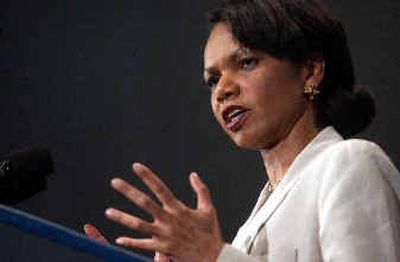9-11 panel to question Tenet, Rice again

WASHINGTON – With weeks of high-drama public hearings behind it, the commission investigating the Sept. 11 attacks plans an additional round of private questioning for CIA Director George J. Tenet and national security adviser Condoleezza Rice before preparing its final report on the attacks, due next month, commission members said Friday.
The nature of the questioning was not known, although both Tenet and Rice have been central figures in the story line surrounding the attacks and the ensuing investigation, and previously testified before commission hearings.
The CIA director, who has resigned as of July 11, has borne the brunt of criticism from the commission for intelligence breakdowns preceding the attacks. He has also been a critic of one of the intelligence reforms that the commission is said to be considering – the creation of an independent domestic spy service.
Rice has been a point person in defending the Bush administration against charges by some commission members that the administration failed to seriously address the al Qaeda threat during its first eight months in office.
“We have some additional investigative work including interviews to follow up on. The two most obvious are Director Tenet and Dr. Rice, where there are still some outstanding questions,” said commission member Richard Ben-Veniste, a former Watergate prosecutor.
The commission is expected to resume its deliberations at a secret location in Washington next week. The group’s chairman, former New Jersey Gov. Thomas H. Kean, said Tenet has agreed to be re-interviewed, and that the commission may submit written questions to Rice.
The commission is racing to meet a July 26 deadline to deliver its final report – an expected 500-page work that will combine a history of the attacks with a series of policy recommendations. Kean indicated in an interview Friday that the recommendations would be wide-ranging.
“We will be in every area, to some extent,” he said, “from congressional oversight, to whether or not there should be changes in the way we respond to emergencies, to immigration reform, to how we deal with al Qaeda, and even, in some areas, foreign policy.”
Over the course of its 18-month existence, the commission has sparred with the White House over requests for documents and interviews with key officials. It has also taken hits from some of its witnesses, including Attorney General John Ashcroft, who publicly alleged that one commission member helped create legal barriers that made it more difficult to monitor terrorist activities in the months and years before the attacks.
Now, after conducting more than 1,100 interviews, hearing public testimony from 140 people, and spending upward of $15 million, the 10 members must produce a report and a hoped-for consensus on ways to turn its investigative product into a blueprint for changing and improving the way the United States combats the terror threat.
“We have to wrestle through these recommendations to try to get commission agreement on some very thorny subjects that the Congress has not agreed on for some time,” Kean said.
This week, the commission completed the last of the public hearings with disclosures that were stunning and sobering, including revelations that the Sept. 11 attacks were a scaled-down version of a more audacious plot that at one time envisioned hijacking 10 aircraft and targeting both coasts.